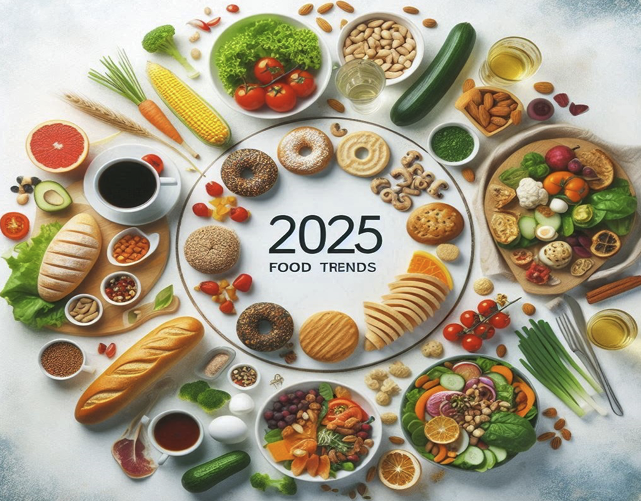
As we look towards 2025, the culinary landscape continues to evolve, influenced by advancements in technology, shifting cultural dynamics, and an increasing focus on sustainability. Consumers are becoming more informed and are seeking new dining experiences that align with their health and environmental values. What innovative food trends will shape our dining tables in the coming year? Let's explore some possibilities.
The rise of plant-based proteins is forecasted to be a dominant trend in 2025, driven by consumer demand for sustainable and health-conscious alternatives. As traditional sources of protein face scrutiny over their environmental impact and health implications, plant-based options are gaining traction. This trend is especially evident in the consumer packaged goods (CPG) sector, where growth is fueled by innovative products that mimic the taste and texture of animal-derived proteins.
Companies are investing heavily in research and development to create plant-based burgers, sausages, and even seafood that appeal to a broader audience. With a focus on delivering both flavor and nutrition, the CPG growth in this sector continues to accelerate, catering to the needs of flexitarians, vegetarians, and environmentally-aware consumers alike.
Sustainability is no longer a buzzword but has become a crucial consideration for both consumers and food businesses. In 2025, we can expect to see more emphasis placed on the environmental impact of food production, transportation, packaging, and waste. As such, companies are implementing sustainable practices throughout their supply chains to minimize carbon footprints and reduce waste.
At the same time, ethical concerns around animal welfare will continue to influence consumer choices. The demand for cage-free eggs, grass-fed beef, and free-range poultry reflects this shift towards more compassionate farming methods. Expect to see more transparency from food producers in showcasing their sustainable and ethical practices.
Another driving force behind the plant-based protein boom is increasing health consciousness. As consumers become more aware of the impact of diet on their health, they are seeking out healthier alternatives to traditional meat and dairy products. Plant-based proteins offer a range of benefits, from being high in fiber and nutrients to being lower in saturated fats and calories.
Moreover, with rising concerns about antibiotics and hormones in animal-derived proteins, plant-based options provide a safer and cleaner source of nutrition. This trend is expected to continue as people prioritize their well-being and look for healthier dining options.
Same trend as with all generational shifts, Gen Z is having a significant impact on the food industry. This tech-savvy generation is more likely to base their food choices on social media trends and influencers rather than traditional advertising. For example, many Gen Z take advantage of GenAI tools for food like Tastewise to know what the next big trends are and to be the first to try them out. This has resulted in the rise of viral food trends like Mochi Donuts, Cloud Bread, and Dalgona Coffee.
As plant-based diets continue to gain popularity on social media platforms like Instagram and TikTok, we can expect to see an increase in demand for plant-based protein options. Brands that are able to tap into this trend by creating visually appealing and shareable content will have a competitive advantage in the market.
Flexitarianism refers to a semi-vegetarian diet that primarily consists of plant-based foods but occasionally includes meat and dairy products. This flexible approach to eating is gaining popularity as more people look for ways to reduce their meat consumption without giving it up completely.
Flexitarianism offers a middle ground between the traditional Western diet and strict vegetarianism or veganism. It allows individuals to incorporate plant-based proteins into their meals while still enjoying occasional animal-derived products. As this trend continues, we can expect to see more restaurants offering diverse and creative plant-based options to cater to flexitarians.
The importance of gut health and the microbiome is gaining more attention in the health and wellness industry. As a result, consumers are seeking out foods that promote a healthy balance of bacteria in their digestive system. Plant-based proteins, such as legumes, nuts, and seeds, contain prebiotics that feed beneficial gut bacteria.
Moreover, plant-based diets have been linked to lower levels of inflammation in the body, which can also benefit gut health. With more people becoming aware of the connection between diet and gut health, we can expect to see an increase in demand for plant-based protein options.
Advancements in technology have made it possible for individuals to customize their diets based on their DNA. This personalized approach to nutrition takes into account an individual's genetic makeup and provides recommendations for optimal health.
Plant-based proteins play a significant role in these personalized diets as they often contain essential nutrients that are beneficial to specific genetic profiles. As more people become interested in optimizing their health through genetic testing, the demand for plant-based proteins is expected to rise.
In conclusion, the food industry is constantly evolving and plant-based proteins are at the forefront of this shift. From advancements in technology to changing consumer preferences, there are many factors driving the growth of plant-based proteins. As more people become health-conscious and environmentally aware, the demand for these products is only expected to increase.
It is an exciting time for the food industry as we see a growing interest in alternative protein sources and innovative ways to incorporate them into our diets. By staying informed on market trends and adapting to changing consumer needs, companies can stay ahead of the curve and capitalize on the growing demand for plant-based proteins.